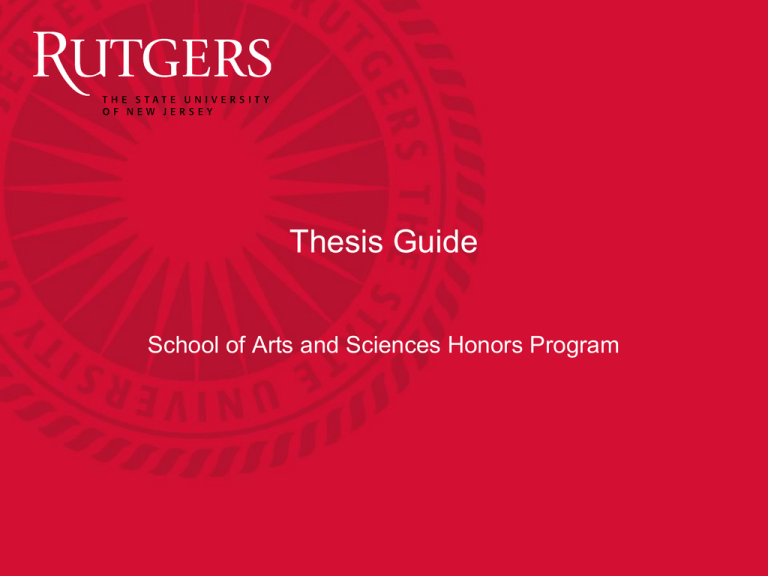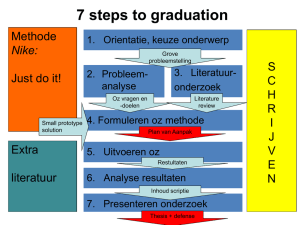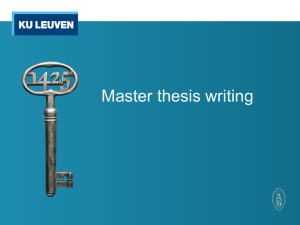Thesis Guide - SAS Honors Program
advertisement

Thesis Guide School of Arts and Sciences Honors Program Thesis Guide FIRST STEPS: WHAT HAPPENS BEFORE THE THESIS? School of Arts and Sciences Honors Program Thesis Guide Three pieces need to be in place to do a thesis: 1. The Topic – The “academic umbrella” under which you will do the thesis – An advisor (or two, if you are doing an Interdisciplinary Honors Thesis) School of Arts and Sciences Honors Program Thesis Guide Deciding on a Topic • • • In the first and second year, you should be letting interesting ideas percolate. In the third year, hopefully things will have begun to focus for you, and you should aim to be clear on at least the overall shape of the topic by the spring of the third year. Remember that research always begins with a question. Identifying your own research topic may seem daunting, but most undergraduates find that their research interests emerge through some combination of experiences in their favorite courses and outside the classroom in their co-curricular pursuits. Talk with friends who have done or are doing a research project, too. In order to formulate a research project that is valid, worth doing, and feasible within the limits of time and money available to you, you should consult with one or more faculty advisors. For these discussions, you should have at least three possible ideas/topics, and some general ideas of how you might go about researching the topics. School of Arts and Sciences Honors Program Thesis Guide Deciding on a Topic • An important personal question in all this is: “Can I live with topic for a whole year?” • In deciding on a topic (or even beginning to think about whether or not to even do a thesis), it sometimes helps to look at the work that others have done. Sample theses are available at the Aresty Center for Undergraduate Research in Milledoler Hall, College Avenue Campus; in the SAS Honors Program Douglass Campus Office in College Hall, Douglass Campus; School of Arts and Sciences Honors Program Thesis Guide 2. Under what “academic umbrella” will you do your thesis? • There are two possibilities: Departmental Honors, done under the “umbrella” of your major department, and Interdisciplinary Honors Thesis (for information, go to http://sasundergrad.rutgers.edu/academics/additionalacademic-programs/thesis-programs). • In both cases (though with some exceptions that have to do with the specifics of a particular department, you will register for a course for the fall and a course for the spring). Check with the program for details about this. School of Arts and Sciences Honors Program Thesis Guide 3. Finding an Advisor • Right from the beginning, as early as the first semester of your first year and continuing through the second year, make solid efforts to get to know faculty. Sit at the front of the classroom, go to office hours, and don’t be afraid to ask questions. • In the third year, as your topic takes shape, you will also begin to focus on finding an advisor. Think first of faculty whom you like and respect, and with whom you would like to work. If you haven’t already talked with someone in this category in your earlier discussions, now is the time to do it; if you have, go back to that person for further discussion. Don’t wait too long to have these discussions; the good faculty get committed quickly, so it is good to start early to get someone lined up. School of Arts and Sciences Honors Program Thesis Guide Finding an Advisor • Please note that the advisor must be a regular faculty member; adjunct/part-time faculty and staff members are not acceptable • After the initial discussion about possible topics and availability, there are some practical issues to consider. Here are some questions to ask in order to get an idea about how the faculty member approaches advising a student doing a thesis: how often would he/she meet with you? What expectations does he/she have in terms of regular submission of work? Will the faculty member be on sabbatical during the coming year? School of Arts and Sciences Honors Program Thesis Guide What about a second or independent reader? • How this is handled depends on the discipline and department, so check with your thesis advisor about policies, expectations, etc. In some cases, the second reader needs to be identified early (during the fall semester) and reported to the department or program; in other cases, the second reader doesn’t come on board until just before the oral defense. • In either case, the second reader must be a member of the Rutgers faculty who is well versed in the student’s research field. If the student’s project spans more than one discipline, it is suggested that a second reader from a discipline other than the supervisor’s be invited. Ideally, the second reader serves as consultant on the project at every stage and to render an independent evaluation. In selecting the second reader, consult with your advisor. School of Arts and Sciences Honors Program Thesis Guide Other Issues to Consider • Overall academic planning is very important, so, if you haven’t already done so, be sure to meet with your general academic advisor, and to discuss how a thesis will fit in with the rest of your coursework. • If possible, take Introduction to the Thesis (01:090:391 or 392), and/or do an Independent Study/Research Project on the possible topic in the junior year (fall or spring). School of Arts and Sciences Honors Program Thesis Guide What’s Next • In most cases, a student completing a senior thesis must first submit a proposal. Presumably, as you gathered information about possible academic umbrellas, you also found out about proposals, deadlines, etc. If you didn’t, do that now. • Then, with your topic, advisor, and academic umbrella in place, if a proposal is required, your next step is to develop and submit the proposal to the relevant academic unit (the department for departmental honors, SAS Office of Undergraduate Education for Interdisciplinary Honors Thesis, Attn.: SAS Honors Program Dean). Be sure to get the proposal in on time! School of Arts and Sciences Honors Program Thesis Guide What’s Next • Important: If your project needs approval from the IRB (Human Subjects Review Board), you will need to attach either your exemption form or your acceptance form before you proceed with your project. Information is available at: http://orsp.rutgers.edu/Humans/default.php • For more comments and information about “first steps,” go to: http://aresty.rutgers.edu/start.htm School of Arts and Sciences Honors Program Thesis Guide WRITING THE PROPOSAL School of Arts and Sciences Honors Program Thesis Guide • The specifics of the proposal will depend on the guidelines and requirements of the program under which you will do the thesis. The form and length of the proposal, and of the thesis, can vary considerably from discipline to discipline. You should follow the usual stylistic guidelines of the field in which you are conducting the project. • In general, the proposal should outline specific goals based on a thorough review of the scholarly and/or scientific work in your field, with explicit methods and plans for how you will analyze, code, or otherwise draw systematic and scholarly conclusions based on your methods. School of Arts and Sciences Honors Program Thesis Guide • The written proposal should state, as clearly as you can at this stage, the topic you will study, what your hypothesis is, the methods you will use, the results that you expect and why these results are important. Your proposal should state the following, where relevant: – – – – – – – what question(s) or hypothesis your project will address; why this is an important question or hypothesis; what evidence is required to answer the question or test the hypothesis; what procedure/s you will use; how these procedure/s will answer the question or test the hypothesis; how you will code or analyze the data (if relevant); what bibliographical sources you will use, including any special permissions you will need. School of Arts and Sciences Honors Program Thesis Guide • The proposal should be of course well-organized, free of spelling and grammatical errors, and clearly written. It is a good idea to complete several drafts of your proposal, and get feedback from your faculty supervisor, before submitting it to the appropriate office. School of Arts and Sciences Honors Program Thesis Guide RESEARCH FUNDS School of Arts and Sciences Honors Program Thesis Guide • Conducting research can often involve some expenses. All applications for research funds for undergraduates are handled through the Aresty Center for Undergraduate Research. • For information, go to http://aresty.rutgers.edu/funding.htm School of Arts and Sciences Honors Program Thesis Guide AND THEN …… School of Arts and Sciences Honors Program Thesis Guide • If you haven’t already done so, register for the appropriate thesis course. • Start doing your research! School of Arts and Sciences Honors Program Thesis Guide Here are some basic suggestions. A. Get to know the Subject Librarian for your topic. B. Some students doing senior theses are granted extended library privileges. If you are granted such privileges, make use of them. C. Check in regularly with your advisor. “Regularly” may mean once a week or once a month (you should have gotten a sense of this in your earlier discussions). One faculty member wrote: “I require that a student check in with me every week even if nothing has been done. This often goads the student into doing something, and even when it doesn't, at least there is personal contact and support.” School of Arts and Sciences Honors Program Thesis Guide D. Make use of the support that is provided through enrollment in either a department-based thesis course or the SAS 1-credit course, Research Workshop, 090:491, 492. E. Plan your work! Keep in mind the differences between on the one hand, the work done for a regular course, as mapped out in a syllabus and reinforced on a weekly basis through class meetings, and, on the other, work done for one’s own project, the deadline for completion of which is months away. This means that large-scale planning is critical. One method suggested is to work backwards from the final deadline, week by week, so that at any one time, both student and faculty advisor know where in the process the student should be (and where the student actually is in relation to that ideal plan). School of Arts and Sciences Honors Program Thesis Guide • With regard to small scale planning, several students and faculty members stressed the importance of working on the project every day, just as one would if the project were a course that met regularly. School of Arts and Sciences Honors Program Thesis Guide WHAT TO DO IF YOU GET STUCK… School of Arts and Sciences Honors Program Thesis Guide 1. Write drafts in email, with no erasing. The relaxed nature of email can sometimes get the words coming. 2. Submit a draft to your advisor, no matter how “awful” the material seems. Ask your advisor to put it in a sealed envelope and not to look at it unless you fail to give him/her a revised draft by a specified date. 3. Do an outline of your project, and then replace components of the outline with paragraphs, working in whatever order you want. This allows you to work first on material that is less scary or difficult. 4. Keep at it. One page at a time. One page a day. Persist. Persist. Persist. Whatever mantra works……… School of Arts and Sciences Honors Program Thesis Guide FINISHING UP School of Arts and Sciences Honors Program Thesis Guide • Make sure you are aware of, and plan your work in relation to, all deadlines for your thesis (submission of title, scheduling of the oral defense, etc.) • It is your responsibility to know the relevant deadlines and to discuss any problems with your advisor. School of Arts and Sciences Honors Program Thesis Guide GUIDELINES FOR FINAL THESIS AND ORAL DEFENSE School of Arts and Sciences Honors Program Thesis Guide How long should the thesis be? • This is something to discuss with your advisor very early in the year, so you have some idea of what you are aiming for. School of Arts and Sciences Honors Program Thesis Guide SAMPLE TITLE PAGE An Analysis of Adolescents In partial fulfillment of Bachelor of Arts Degree in the Department of Sociology The School of Arts & Sciences Honors Program Rutgers, The State University of New Jersey The School of Arts & Sciences Written under the Direction of: Professor’s Name Department By: (Your Name) (*Signature of Thesis Director) School of Arts and Sciences Honors Program Thesis Guide Oral Defense • By early March, you should have decided, with your faculty advisor(s), the date of your oral defense. Certainly as the time of your oral defense gets closer, you should talk with your advisor about what s/he expects. • Plan to prepare a short (15-20 minute) presentation on your work. The presentation should include a statement of the research question(s), a summary of your methodology and data, a statement about data gathering, a summary of your results, a statement about implications for possible future work, and a reflection on the overall work. Overall, consider what you want your audience to know or understand about what you did and how you did it. School of Arts and Sciences Honors Program Thesis Guide Oral Defense • If you are going to do a Power Point presentation, be sure to get to the assigned room early to make sure all the equipment is in place and working. (And, since it sometimes happens that the equipment won’t work, come to the defense prepared to do it without the Power Point presentation!) School of Arts and Sciences Honors Program Thesis Guide Oral Defense • You can write out what you want to say, but remember that in the defense you will not be reading a prepared statement; rather, you will be speaking to the audience. (If you do write out what you want to say, remember that double-spaced typed pages take approximately 3 minutes to read. If you have more than five pages, it is too long.) • What (not) to wear: Dress code is “business casual.” This means no blue jeans, no sneakers, no shorts, no t-shirts. Check with your advisor about any specifics. School of Arts and Sciences Honors Program For more information, go to: Thesis Programs: http://sasundergrad.rutgers.edu/academics/additionalacademic-programs/thesis-programs SAS Honors Program: http://www.sashonors.rutgers.edu/academics/curriculum /capstone.html Questions? Contact Us School of Arts and Sciences Honors Program 35 College Avenue New Brunswick, NJ 08901 p. 848-932-7964 honors@sas.rutgers.edu www.sashonors.rutgers.edu









